Press releases
Nikol Pashinyan delivers speech at the Netherlands Institute of International Relations, answers the questions of the participants of the event
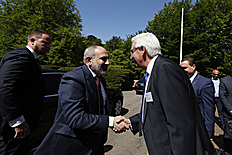 1670x1113px - 581 Kb
1670x1113px - 581 Kb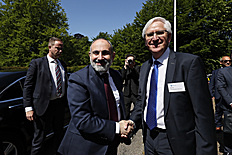 1670x1113px - 630 Kb
1670x1113px - 630 Kb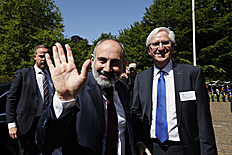 1670x1113px - 566 Kb
1670x1113px - 566 Kb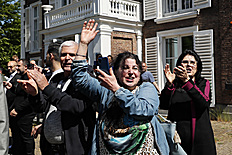 1670x1113px - 663 Kb
1670x1113px - 663 Kb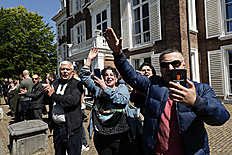 1670x1113px - 762 Kb
1670x1113px - 762 Kb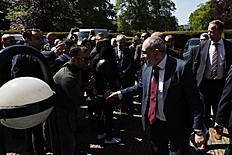 1670x1113px - 515 Kb
1670x1113px - 515 Kb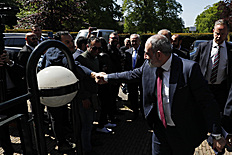 1670x1113px - 522 Kb
1670x1113px - 522 Kb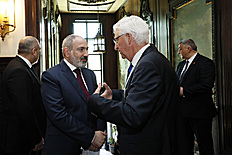 1670x1113px - 472 Kb
1670x1113px - 472 Kb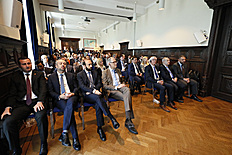 1670x1113px - 688 Kb
1670x1113px - 688 Kb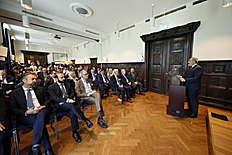 1670x1113px - 674 Kb
1670x1113px - 674 Kb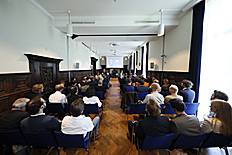 1670x1113px - 518 Kb
1670x1113px - 518 Kb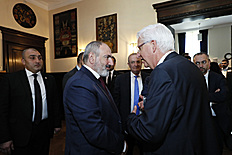 1670x1113px - 382 Kb
1670x1113px - 382 Kb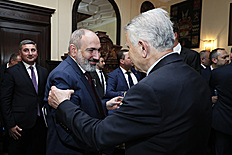 1670x1113px - 410 Kb
1670x1113px - 410 Kb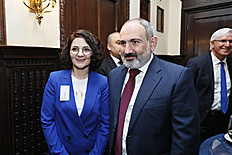 1670x1113px - 508 Kb
1670x1113px - 508 Kb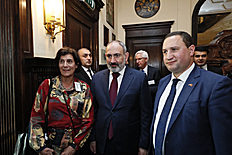 1670x1113px - 541 Kb
1670x1113px - 541 Kb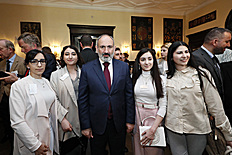 1670x1113px - 605 Kb
1670x1113px - 605 Kb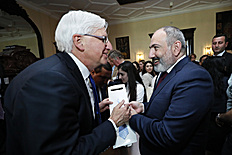 1670x1113px - 333 Kb
1670x1113px - 333 Kb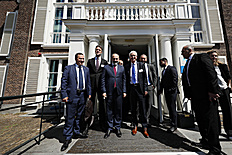 1670x1113px - 875 Kb
1670x1113px - 875 Kb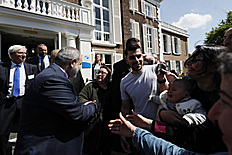 1670x1113px - 532 Kb
1670x1113px - 532 Kb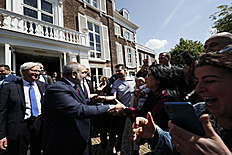 1670x1113px - 598 Kb
1670x1113px - 598 Kb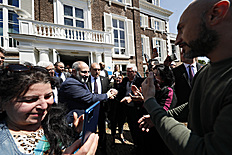 1670x1113px - 639 Kb
1670x1113px - 639 Kb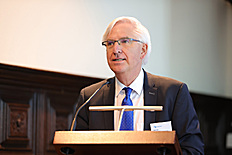 1670x1113px - 249 Kb
1670x1113px - 249 Kb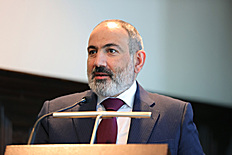 1670x1113px - 352 Kb
1670x1113px - 352 Kb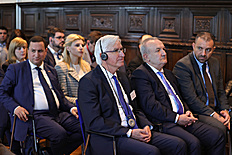 1670x1113px - 521 Kb
1670x1113px - 521 Kb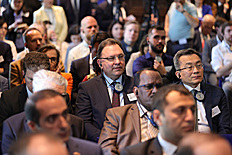 1670x1113px - 542 Kb
1670x1113px - 542 Kb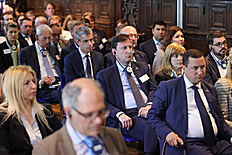 1670x1113px - 590 Kb
1670x1113px - 590 Kb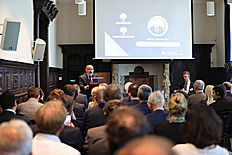 1670x1113px - 456 Kb
1670x1113px - 456 Kb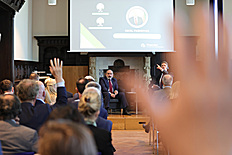 1670x1113px - 400 Kb
1670x1113px - 400 Kb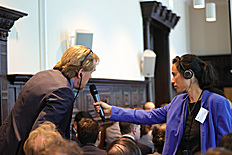 1670x1113px - 442 Kb
1670x1113px - 442 Kb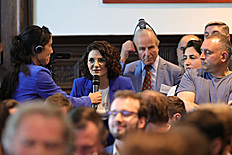 1670x1113px - 495 Kb
1670x1113px - 495 Kb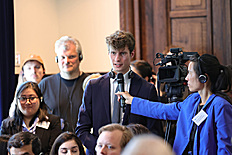 1670x1113px - 519 Kb
1670x1113px - 519 Kb
more 28 photos
Prime Minister Nikol Pashinyan, who is in The Hague, visited the Netherlands Institute of International Relations, Clingendael. The Prime Minister was met by Ron Ton, Director of the Netherlands Institute for International Relations, who welcomed the PM’s visit to the Institute.
The Prime Minister delivered a speech at the institute, during which he referred to the reforms of democratic institutions being carried out in Armenia, the processes taking place in the South Caucasus and the region.
“I am the first Armenian leader to pay an official visit to the Kingdom of the Netherlands. I view this visit not only in the context of traditional Armenian-Dutch historical ties, trade and economic relations, but also in the context of Armenia's democracy. I must emphasize that after the Nonviolent, velvet, popular revolution in Armenia in 2018, we felt the support of the Netherlands to democratic reforms in Armenia. In general, in Armenia I now say more often that democracy is the main brand of the Republic of Armenia, by which our country is recognized by the international community these days, particularly in Europe and the European Union. I must emphasize that this is not just my assessment, because the international institutions that deal with global research on democracy, the fight against corruption, the press, and freedom of speech register this reality. I must state that in 2021, for the first time, Armenia was ranked among the countries with electoral democracies by international democratic institutions, and I consider this a significant achievement.
In recent years, during the last four years, Armenia has made tremendous progress in the fight against corruption or the perception of corruption. And yes, I must also make a loud statement, saying that systemic corruption has been eradicated from Armenia. Although there are some corruptions phenomena that we are consistently fighting against, and that is visible. By 2021, we, despite the post-war crisis year, have made tremendous progress in the area of freedom of speech and the press. According to the latest published indexes, Armenia is the 51st in the world”, the Prime Minister aid, adding that the Government of Armenia is resolute in its commitment to carry out democratic reforms in the country.
Nikol Pashinyan emphasized that the pages like public distrust towards the election results or the practice of falsifying elections are closed in Armenia.
"I can say with confidence that Armenia has no way back, because the source of these reforms is not the government, but the people, the citizens of the Republic of Armenia, who clearly, firmly take the responsibility for democracy, the rule of law. Of course, we all understand that we still have a long way to go in terms of institutional development. Unfortunately, I cannot present great results in the field of having an independent judiciary. All I can only say that this is one of the most important issues facing Armenia today. And the biggest problem is that studying the leading experience in this field we see that there are no tested formulas. We see that even in many European countries the same processes take place when there is a struggle, it is difficult to distinguish who is right and who is wrong in the struggle for an independent judiciary. That is why here we prefer to move forward in a way that does not harm, because we are talking about guaranteeing people's freedoms and rights."
In this context, the Prime Minister referred to the reforms being implemented in penitentiaries. "I would like to also emphasize an indicator that has to do with democracy, the rule of law, the protection of human rights, and an independent judiciary. Years before the revolution, our penitentiaries were all overcrowded. In other words, we even had a situation when detainees, convicts, had no place to sleep, they had to sleep in turns. Of course, I was lucky when I was a political prisoner, I did not face such a problem, but it was a public problem in the Republic of Armenia. Today, the Republic of Armenia ranks second in Europe in terms of prison population. I mean it is among the least loaded countries, I must say that we are second only to Monaco in that index. We are in a very good position in terms of the prison population compared to all other countries. This is also an important indicator. Recently, responding to the criticism of our opposition figures, of course, there is opposition in a democratic country, there is strong criticism, sometimes radical criticism. I presented that same indexes when giving a speech at the parliament, because some people try to show that we deviate from democratic standards, persecute our political opponents. I said that in the countries that deviate from the path of democracy and follow the path of repression, prisons are usually opened, not closed, while in our country, during this period of our rule, the two largest prisons have been closed”, Prime Minister Pashinyan said.
The Armenian PM once again referred to the fight against corruption in the country, emphasizing, "I must note, of course, with great sadness and a little displeasure that not only former officials are now accused of corruption, but also officials who have been appointed as ministers by me, have been members of my government, have been high-ranking officials."
Referring to the 44-day war, Nikol Pashinyan said, "There is an opinion that it was democracy in Armenia that led to the 44-day war in 2020, the second Karabakh war. The main question that is hanging in the atmosphere in Armenia today is to what extent democracy is able to ensure the security of the country. This is really a very important question and I want to comment on it. The 2020 Karabakh war has nothing to do with Armenia being a democracy. The situation here is more serious, I have to draw some parallels. It is generally accepted, or at least there was such an opinion also in Europe in the early 1990s, that it was the Karabakh movement that started in 1988 and later led to the collapse of the Soviet Union or a change in the world order. My deepest belief and conviction is that in fact the Karabakh war of 2020, the 44-day war, was, in fact, another sign that global geopolitical change awaits us; a change in the world order will take place. In fact, there were two reasons for the war, the first being the change in the balance of power between the global and regional powers, which took place over many years, and Azerbaijan's negotiation policy against this background, “give us what we want, otherwise we will get it through war”. In this sense, it is clear that war was inevitable in this context. Of course, it was a severe ordeal for the Armenians of Nagorno Karabakh, for Artsakh, for the Republic of Armenia, for the democracy of Armenia. I must state that, nevertheless, the situation in our region remains extremely tense; in fact, the reasons I am talking about have not changed. I want to give a clear picture of the post-war situation, which was confirmed by the trilateral declaration of November 9, 2020, as a result of which the peacekeeping forces of the Russian Federation entered Nagorno Karabakh, so that it becomes clear for everyone, not only experts, where the problem is. After the war or after the November 9 declaration, Azerbaijan has adopted the following policy that the Nagorno Karabakh issue is resolved, but this is not only a political statement, but, in fact, the culmination of the ideas Azerbaijan had about the settlement of the Karabakh conflict and continues to have. If we formulate that policy in one word, that policy is the following: Karabakh without Armenians. And there is no exaggeration here. Now I will show with concrete examples that this is the policy. For example, this spring we had the following incident, when representatives of the Azerbaijani Armed Forces made announcments with loudspeakers near the Armenian villages of Nagorno-Karabakh, warning them to leave their homes, otherwise they will be forcibly evicted. Another important cincident: At night, the houses of the Armenian villages of Karabakh were illuminated with strong lights, and the Adhan was recited with loudspeakers, which is an invitation to Muslim prayer. We, of course, the Armenian people have great respect for Muslim culture and religion, but I must say that this is, in fact, a simple example of religious terrorism. For many years, Azerbaijan has been trying to give a religious context to the Karabakh issue, which it has failed to do because we have warm, friendly, fraternal relations with many Muslim countries, but once again an attempt is being made to reintroduce this factor into the Nagorno-Karabakh conflict zone.
The next thing I would like to mention is the following. Nagorno-Karabakh is generally a warm region, but in March of this year, an unprecedented amount of snow fell there, and on March 7-11, unprecedented frosts began. And just in those days we saw the explosion of the gas pipeline supplying Karabakh in the territories under the control of Azerbaijan. It took a long time to repair it, while after the repair, Azerbaijan installed a valve on the pipe, trying to use it as a means of political, moral and social pressure. I mean, everything is done so that the Armenians consider their presence in Artsakh and Nagorno Karabakh impossible. And with this in mind they say that Nagono Karabakh issue is solved, that no Armenian will stay in Nagono Karabakh, the Armenians of Nagono Karabakh will not have any rights, the identity of Armenians of Nagorno Karabakh will be destroyed and eradicated. There is no exaggeration in what I say. Look, quite recently a rather strange statement was made by the Ministry of Culture of Azerbaijan. They announced that a working group has been set up, and as they describe it, for "eliminating and deleting fake records from churches considered to be Armenian". While a few months before that, the president of Azerbaijan, visiting an area under the control of Azerbaijan, where there is an ancient Armenian church, literally stated the following: "The records are false, that forgery must be eliminated." This is not just a cultural action against historical monuments at all. Although, even if it was, it is already an outrageous and inadmissible fact. The political goal of this, when we put it together with other statements made by Azerbaijan, is to state that the Armenians of Karabakh have just recently appeared in Nagorno Karabakh under different circumstances, so they have no legitimate right to live there. And this is the policy adopted by Azerbaijan today. Meanwhile, our perception is completely different, our perception is that the Nagorno Karabakh issue is not a territorial issue at all, as Azerbaijan was trying to present, the Nagorno Karabakh issue is a matter of right, and our policy, our message to the international community is that we must work to protect the rights of the Armenians of Nagorno-Karabakh. And it is in this context that we, despite all this negativity, have adopted a peace agenda. This was not easy in a situation where there was a war, when we had casualties. We have said that regardless of everything, it is the commitment and mandate of our government to do everything to achieve peace in our region, in Armenia-Azerbaijan relations, in the context of the Nagorno-Karabakh conflict, to do everything for peace, and not simply to do everything, but to achieve peace, formulate the problem and solve it. You may have noticed that before I came here there were two demonstrations, one in defense of our government, one against our government or personally me. This is where all this comes from, because many people, many compatriots think that by talking about the peace agenda we are betraying our national identity, we are betraying the interests of our country, we are betraying the Armenians of Nagorno Karabakh, we are betraying Nagorno Karabakh, we are leaving them defenseless. But our conviction is the opposite. We listen to that criticism, we analyze that criticism, we try to understand that criticism. Even in some cases we understand it generally, but the biggest task of the politician, the political team, the government elected by the people is to go the hard way, because the easy ways do not lead to good results. And the result we expect is the following: an era of peaceful development for our country, our region. For that, we need to successfully carry out the opening of regional communications so that our railways and roads with Azerbaijan operate and be open".
Nikol Pashinyan also referred to the process of normalization of Armenian-Turkish relations. "We have started a dialog with Turkey, we have agreed to try to normalize relations without preconditions, it is clear that in a situation where there is a very large negative historical heritage, this is not easy to do. I am talking about this here, because it is my belief that without the active, sincere support of the international community, we will have less chances to succeed. We want the international community to hear our voice, we want the international community to see the people who live in Nagorno-Karabakh today, who, every day, despite many factors, fight every day for the right to live in their homeland, but on the other hand, there is a strange fact that these people are, in fact, deprived of the opportunity to fully communicate with the international community. Today, many international organizations, agencies, UN, UNESCO, even the OSCE, are deprived of the opportunity to enter Nagorno-Karabakh because Azerbaijan blocks that opportunity, but this practice, frankly, is not so comprehensible, because if there is no desire to transform the reality, that policy of restricting that access is not so comprehensible”.
The Prime Minister once again referred to the peace agenda, the normalization of Armenia-Azerbaijan relations, noting, “We have clearly stated that yes, we are adopting a peace agenda, we must follow the path of demarcation and delimitation of the borders with Azerbaijan, in other words, we should commence peace talks. I want to make a very important clarification in this regard. In February-March, Azerbaijan presented its approaches on the normalization of Armenia-Azerbaijan relations, where there are five main points. These refer to mutual recognition of each other's territorial integrity, demarcation of borders, opening of communications, absence of territorial claims from each other. And we, looking at those proposals, saw that there was nothing unacceptable to them in them, but we noticed that those points did not address the whole agenda of our relations. And we, examining those proposals, saw that there is nothing unacceptable for us in them, but we noticed that those points do not address the whole agenda of our relations. And we completed the agenda of those relations, which includes the issue of the security, rights of the Armenians of Nagorno Karabakh and the final status of Nagorno Karabakh. When a meeting mediated by the President of the European Council Charles Michel took place on April 6, we discussed the issue with the president of Azerbaijan, and I said that there is nothing unacceptable in the points they offer us. If the Azerbaijani side agrees to combine our ideas and start negotiations on that basis, we are ready for that. Returning from Brussels, I said that we had reached an agreement, in fact, the Azerbaijani side also announced it. But lately, we hear statements from Azerbaijan trying to create the impression that only Azerbaijan's proposals will be on the table. This at least does not correspond to the agreements we reached in Brussels. I must state, reaffirm my position today, publicly, officially, before you, that we are ready to negotiate on the basis of the mentioned principles, on the basis of that agenda. Although, in fact, the process that was planned, nothing has changed in that process. A meeting of our representatives on the issue of demarcation and delimitation is planned in the near future, and the Ministers of Foreign Affairs will also meet.
And I have to say something as a summary. You know, we have gone through many ordeals over the last two years, but today I can say with deep conviction that we are on the right track. This is the path of advancing the peace agenda, we know it will be very difficult, but we are ready to take on that political responsibility, because we feel, see, bear the responsibility to have a decisive contribution to the establishment of peace in our country, our region, and global peace in general. To make a decisive contribution, I hope the international community, our partners, the Kingdom of the Netherlands, all our partners will support us in this effort."
The Prime Minister answered the questions of the attendees: representatives of expert circles, students, which referred to the Armenian-Russian relations, the partnership between Armenia and the European Union, the Collective Security Treaty Organization, the processes taking place in the South Caucasus, increasing the role of women in public and political life.